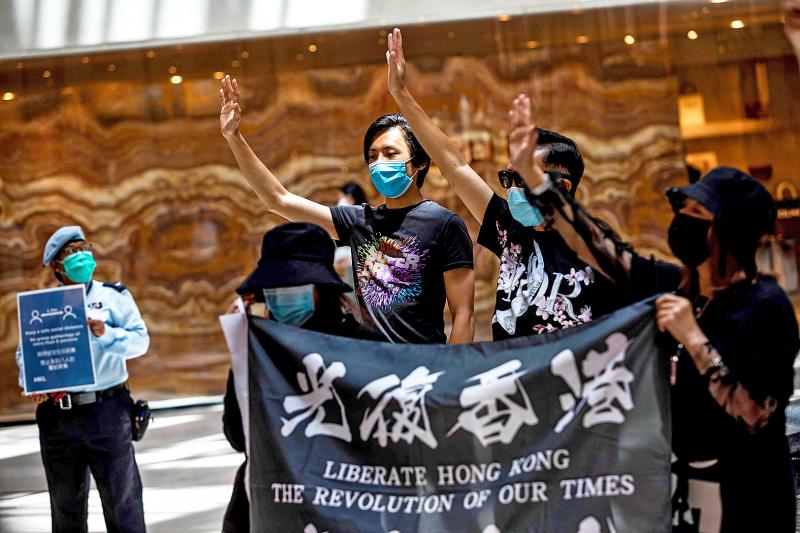Beijing yesterday warned Washington of retaliation after US President Donald Trump announced restrictions on Chinese students in the US in protest against new national security legislation for Hong Kong.
China also said ongoing unrest in the US highlighted its severe problems of racism and police violence — and exposed Washington’s double standards in supporting Hong Kong’s protesters.
The two sides have clashed repeatedly on different topics and on Friday Trump said that he would restrict Chinese graduate students and start reversing the special status enjoyed by Hong Kong in customs and other areas.

Photo: AFP
Beijing reacted angrily to the moves, saying it was “detrimental to both sides.”
“Any words and actions that harm the interests of China will be met with counter-attacks on the Chinese side,” Chinese Ministry of Foreign Affairs spokesman Zhao Lijian (趙立堅) told a press briefing in Beijing.
Washington’s measures “seriously interfere in China’s internal affairs and undermine US-China relations,” he said.
Zhao seized on ongoing anti-racism protests in the US to accuse the US of hypocrisy, calling racism “a chronic disease of American society.”
Washington’s response to the death of George Floyd, an unarmed black man, at the hands of police was a “textbook example of its world-famous double standards,” Zhao said.
“Why does the US lionize the so-called Hong Kong independence and black violence elements as heroes and activists, while calling people who protest against racism ‘rioters,’” Zhao said.
Meanwhile, Hong Kong police yesterday banned the annual June 4 vigil marking the 1989 Tiananmen Square Massacre, citing the coronavirus pandemic, the first time the gathering has been halted in three decades.
The police, in a letter to organizers, said the vigil would violate social-distancing rules that ban gatherings of more than eight people.
Organizer Lee Cheuk-yan (李卓人), chair of the Hong Kong Alliance in Support of Patriotic Democratic Movements of China, expressed disappointment and urged people to light candles on their own and observe a moment of silence.
However, Amnesty International said a socially distanced vigil should be facilitated.
“COVID-19 must not be used as an excuse to stifle freedom of expression,” Amnesty deputy director for East and Southeast Asia Joshua Rosenzweig said. “With this ban, and a disastrous national security law looming, it is not clear if Hong Kong’s Tiananmen vigil will ever be allowed to take place again.”
In other developments, throngs of people lined up yesterday at DHL courier outlets across the territory, many to send documents to the UK to apply for or renew what is known as a British National (Overseas) passport amid concerns about the new legislation.

ROLLER-COASTER RIDE: More than five earthquakes ranging from magnitude 4.4 to 5.5 on the Richter scale shook eastern Taiwan in rapid succession yesterday afternoon Back-to-back weather fronts are forecast to hit Taiwan this week, resulting in rain across the nation in the coming days, the Central Weather Administration said yesterday, as it also warned residents in mountainous regions to be wary of landslides and rockfalls. As the first front approached, sporadic rainfall began in central and northern parts of Taiwan yesterday, the agency said, adding that rain is forecast to intensify in those regions today, while brief showers would also affect other parts of the nation. A second weather system is forecast to arrive on Thursday, bringing additional rain to the whole nation until Sunday, it

LANDSLIDES POSSIBLE: The agency advised the public to avoid visiting mountainous regions due to more expected aftershocks and rainfall from a series of weather fronts A series of earthquakes over the past few days were likely aftershocks of the April 3 earthquake in Hualien County, with further aftershocks to be expected for up to a year, the Central Weather Administration (CWA) said yesterday. Based on the nation’s experience after the quake on Sept. 21, 1999, more aftershocks are possible over the next six months to a year, the agency said. A total of 103 earthquakes of magnitude 4 on the local magnitude scale or higher hit Hualien County from 5:08pm on Monday to 10:27am yesterday, with 27 of them exceeding magnitude 5. They included two, of magnitude

CONDITIONAL: The PRC imposes secret requirements that the funding it provides cannot be spent in states with diplomatic relations with Taiwan, Emma Reilly said China has been bribing UN officials to obtain “special benefits” and to block funding from countries that have diplomatic ties with Taiwan, a former UN employee told the British House of Commons on Tuesday. At a House of Commons Foreign Affairs Committee hearing into “international relations within the multilateral system,” former Office of the UN High Commissioner for Human Rights (OHCHR) employee Emma Reilly said in a written statement that “Beijing paid bribes to the two successive Presidents of the [UN] General Assembly” during the two-year negotiation of the Sustainable Development Goals. Another way China exercises influence within the UN Secretariat is

Taiwan’s first drag queen to compete on the internationally acclaimed RuPaul’s Drag Race, Nymphia Wind (妮妃雅), was on Friday crowned the “Next Drag Superstar.” Dressed in a sparkling banana dress, Nymphia Wind swept onto the stage for the final, and stole the show. “Taiwan this is for you,” she said right after show host RuPaul announced her as the winner. “To those who feel like they don’t belong, just remember to live fearlessly and to live their truth,” she said on stage. One of the frontrunners for the past 15 episodes, the 28-year-old breezed through to the final after weeks of showcasing her unique